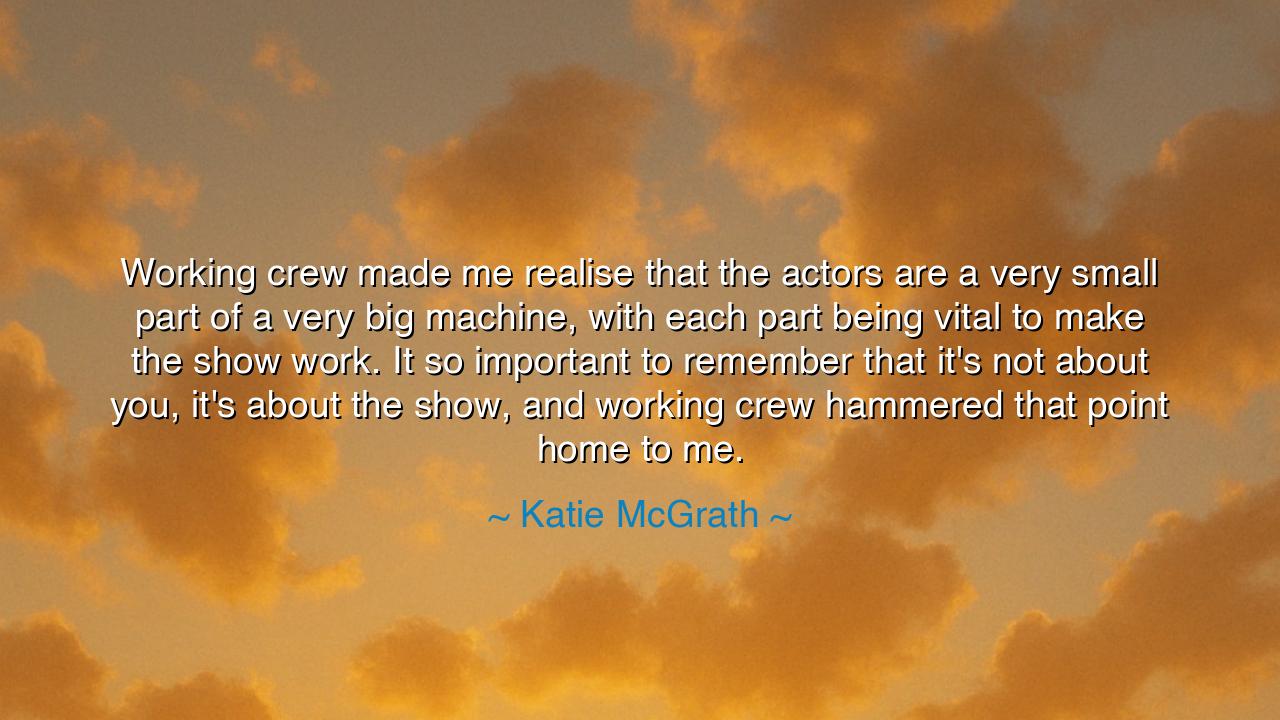
Working crew made me realise that the actors are a very small
Working crew made me realise that the actors are a very small part of a very big machine, with each part being vital to make the show work. It so important to remember that it's not about you, it's about the show, and working crew hammered that point home to me.






In the annals of the playhouse—those shadowed sanctuaries where breath becomes story—there is a lesson spoken in hushed corridors and rope-bitten catwalks. It is the wisdom that working crew first learns and then teaches to all who would take the stage: the actors are but a small part of a very big machine. Lamps must be focused, masking set, cues called as if by the pulse of a single heart. Each part is vital; without the quiet labor of many, the loud brilliance of one will gutter in the dark. Thus speaks Katie McGrath, and thus echo the ancients of every craft: glory is a chorus, never a solo.
Remember the rites behind the curtain. The flyman who knots a safety line, the costumer who stitches a seam no spectator will ever see, the stage manager who reads time like a priest reads stars—these are the unseen pillars. The text says, “It is not about you, it is about the show,” and this is not a rebuke but a release. When the self loosens its grip, the work tightens its weave. In the hush before the overture, the working crew becomes a guild of guardians. They hammer cues like nails into the spine of the evening, building a house in which the audience may shelter for a few bright hours.
Many have learned this humility late; McGrath learned it early, hands in the honest grit of backstage. There, the vanity of the mirror meets the discipline of the wrench, and the wrench wins. The stage is a ship and the crew its rigging; the actor may be the figurehead, but it is the ropes and sails that take the audience across. To know the calluses of the crew is to know the truth of theater: the show is a living covenant, and it survives only when every tendon serves the whole.
Consider a tale beyond the proscenium, where the stakes were measured not in applause but in breath: Apollo 13. When an oxygen tank exploded and the capsule dimmed, the world looked toward the three men in the tiny craft. Yet salvation was a backstage miracle—an army of engineers, flight controllers, seamstresses of checklists and tinkerers of filters, all working in fluorescent midnight. They fashioned a lifeboat from each part at hand, rehearsed procedures like stage managers calling Act II, and brought the cast home alive. The astronauts received the ovation; the crew carried the show. This is the ancient truth in a modern key: the constellation shines because the darkness is charted by many.
Or look further back, to the Gothic cathedrals whose stones still sing. No name is carved for the mason who perfected the hidden joint, for the quarrymen who hauled limestone through sleet, for the glazier who soldered a star no pilgrim would notice from the nave. Yet without them the vault would collapse, the light fall flat, the chant dissipate. The medieval master knew to bow to the big machine—not of iron, but of craft—where each part was vital to hold up heaven’s Echo. The cathedral, like the show, existed to lift others, not its makers, and this humility became its radiance.
Let the teaching be carved upon the lintel of your labor: if you would shine, join the constellation. Make your excellence a service. Begin every endeavor by naming the hidden hands—designers, testers, editors, operators—and asking what they need to do their best work. Share credit aloud and take blame in silence. Train to be cross-functional: learn a little sound, a little light, a little rope. In times of strain, volunteer for the unglamorous fix—the reset, the sweep, the late-night patch—because that is where loyalty becomes a verb and teams become oaths.
Practical rites for the road: (1) Before any performance—speech, product launch, or opening night—hold a “crew roll call” and acknowledge by name those who stand behind you; let the room hear the map of the big machine. (2) Practice the discipline of de-centering: once a week, take the task that grants no spotlight and do it perfectly. (3) Build a post-mortem liturgy: after the work, ask what hammered the lesson home—what failed, who saved it, and how to codify that rescue into ritual. (4) Keep a “service ledger,” a small book of favors given and debts of gratitude owed, and settle it generously. Thus will you remember, when the curtain trembles and the heart runs fast, that it is not about you, it is about the show—and by honoring each part, you will help the whole become unforgettable.






AAdministratorAdministrator
Welcome, honored guests. Please leave a comment, we will respond soon